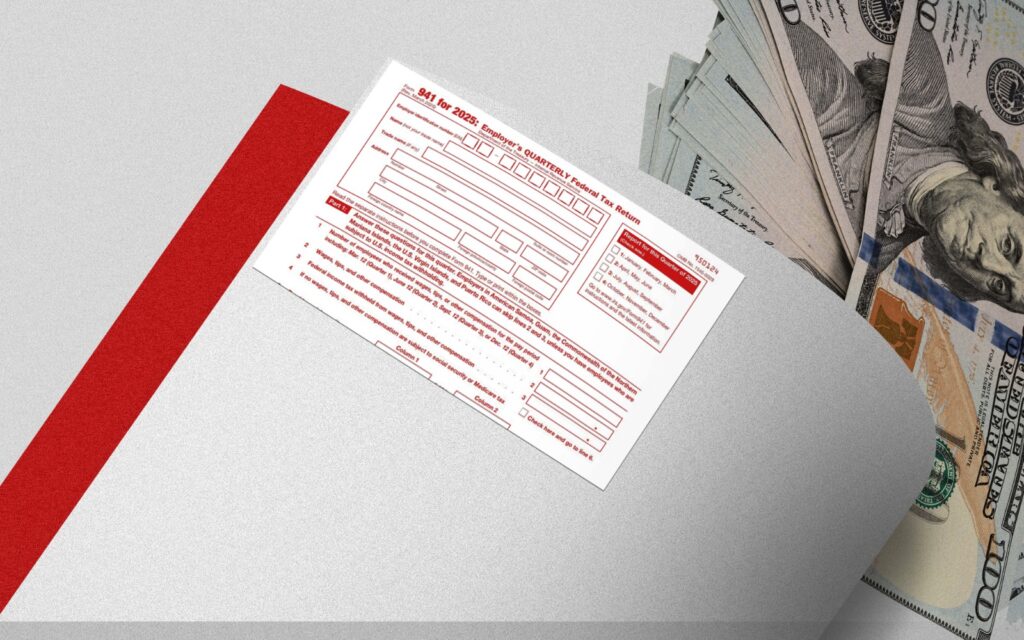Filing payroll taxes correctly is one of the most critical responsibilities for employers, and it’s a core part of both tax services and payroll processing. The IRS Form 941 (also called the 941 form) is used to report federal income taxes, Social Security, and Medicare taxes withheld from employees’ paychecks. Missing deadlines or making errors can result in penalties, making it essential to understand the process completely.
This blog explains everything you need to know about Form 941: who must file, when it’s due, step-by-step instructions, where to mail Form 941, and when to attach Schedule B.
What Is Form 941 and Who Must File It?
Form 941 is the Employer’s Quarterly Federal Tax Return. It reports the total wages paid, federal income tax withheld, and both employer and employee portions of Social Security and Medicare taxes.
Businesses that offer payroll services or rely on professional tax services often use Form 941 to ensure compliance across multiple quarters. If you pay wages subject to federal withholding or payroll taxes, you must file Form 941 each quarter. Exceptions include seasonal employers, household employers, and those eligible to file annual Form 944 instead.
Form 941 Due Dates for 2025
Form 941 is due quarterly:
- Q1 (Jan–Mar): April 30, 2025
- Q2 (Apr–Jun): July 31, 2025
- Q3 (Jul–Sep): October 31, 2025
- Q4 (Oct–Dec): January 31, 2026
If a due date falls on a weekend or federal holiday, file the next business day.
Form 941 Instructions: Step-by-Step Filing Guide
Filing Form 941 becomes manageable when broken into clear steps:
Step 1: Gather Required Information
Collect payroll data, including employee wages, tax withholdings, and employer tax contributions. Have your EIN, business name, and address ready. Confirm the quarter you’re filing for (check the box on the form).
Step 2: Complete Basic Business Details
Fill in your business information in the header section of Form 941. This identifies your company and ensures the IRS credits the correct account.
Step 3: Report Total Wages and Withholdings
Provide total wages paid during the quarter and federal income tax withheld. Break down taxable Social Security and Medicare wages. If applicable, report Additional Medicare Tax (for high earners).
Step 4: Calculate Payroll Taxes
Add up employee and employer portions of Social Security and Medicare taxes. This ensures you’re reporting the full tax liability accurately. Use IRS tax tables to confirm the correct percentages.
Step 5: Apply Adjustments and Credits
Adjust for sick pay, tips, COBRA credits, and other applicable credits. Carefully review this section to prevent discrepancies that could trigger IRS inquiries.
Step 6: Determine Tax Liability
Calculate total tax liability for the quarter and compare it with deposits already made. If you owe additional taxes, prepare payment; if you overpaid, select whether to apply the credit to the next return or request a refund.
Step 7: Sign and File
An authorized individual must sign and date the form. Unsigned forms are considered incomplete and may incur penalties.
Where to Mail Form 941
The correct mailing address for Form 941 depends on your business location and whether you are sending payment. Below are the updated addresses provided by the IRS for 2025:
Mailing Addresses for Form 941
| Location | Mail Return Without Payment | Mail Return With Payment |
| Connecticut, Delaware, District of Columbia, Georgia, Illinois, Indiana, Kentucky, Maine, Maryland, Massachusetts, Michigan, New Hampshire, New Jersey, New York, North Carolina, Ohio, Pennsylvania, Rhode Island, South Carolina, Tennessee, Vermont, Virginia, West Virginia, Wisconsin | Department of the Treasury Internal Revenue Service Kansas City, MO 64999‑0005 | Internal Revenue Service P.O. Box 932100 Louisville, KY 40293‑2100 |
| Alabama, Alaska, Arizona, Arkansas, California, Colorado, Florida, Hawaii, Idaho, Iowa, Kansas, Louisiana, Minnesota, Mississippi, Missouri, Montana, Nebraska, Nevada, New Mexico, North Dakota, Oklahoma, Oregon, South Dakota, Texas, Utah, Washington, Wyoming | Department of the Treasury Internal Revenue Service Ogden, UT 84201‑0005 | Internal Revenue Service P.O. Box 932100 Louisville, KY 40293‑2100 |
| No legal residence or principal place of business in any state (including American Samoa, Guam, CNMI, USVI, and Puerto Rico) | Internal Revenue Service P.O. Box 409101 Ogden, UT 84409 | Internal Revenue Service P.O. Box 932100 Louisville, KY 40293‑2100 |
| Special filing address for exempt organizations, governmental entities, and Indian tribal governmental entities (regardless of location) | Department of the Treasury Internal Revenue Service Ogden, UT 84201‑0005 | Internal Revenue Service P.O. Box 932100 Louisville, KY 40293‑2100 |
Electronic Filing vs Mailing Form 941
The IRS recommends e-filing for speed, accuracy, and confirmation of receipt. Many payroll software solutions automatically file Form 941 electronically, which minimizes errors and ensures compliance.
Schedule B (Form 941): When to Include It
Schedule B (Form 941) is required for employers who deposit payroll taxes on a semiweekly schedule. It provides a day-by-day breakdown of tax liability, ensuring deposits are credited accurately.
If you are a monthly depositor, you generally do not need Schedule B. Missing this schedule when required can lead to IRS misapplications and penalties.
Common Filing Mistakes to Avoid
- Forgetting to check the correct quarter on the form
- Not including Schedule B when semiweekly deposits are required
- Reporting incorrect wage or tax amounts
- Missing filing deadlines or using outdated IRS addresses
- Failing to reconcile Form 941 with annual Forms W‑2/W‑3
Need Help Filing Form 941?
Form 941 can feel overwhelming, especially when managing multiple employees, payroll taxes, and deadlines. The Madtax offers expert bookkeeping and payroll tax services to ensure your Form 941 is filed correctly and on time, avoiding costly penalties and compliance issues.
Contact The MadTax today for help with Form 941 filing, tax strategies, and bookkeeping cleanup tailored to your business needs.

